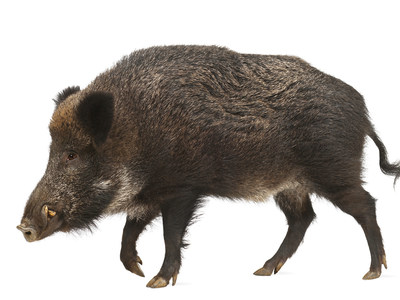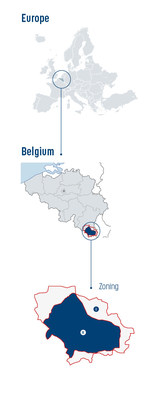Belgium deals well with the outbreak of African swine fever (ASF) in September 2018. That is the conclusion of European ASF experts. Belgium succeeds in keeping domestic pigs and captive wild pigs free of ASF contamination -- thus keeping all its pork virus-free and suitable for consumption and export. Therefore, trade of Belgian pork is free in the European Union.
A sketch of Belgium's approach.
BRUSSELS, July 10, 2019 /PRNewswire/ -- On 13 September 2018, the African swine fever (ASF) virus was confirmed in two wild boars in the Belgian municipality Etalle -- in a region where only very few domestic pigs are kept. The FASFC (Belgium'sFederal Agency for the Safety of the Food Chain) demarcated an "infected zone", in consultation with the European Commission and ministers. To avoid contamination, the few domestic pigs in this zone were preventively eradicated between 27 September and 3 October 2018. The products of these pigs did not enter the food chain and was not used in the feed industry.

Swine fever prevention and surveillance in Belgium
- Registration
All pig farms must be registered with the Federal Agency for the Safety of the Food Chain (FASFC, the competent authority). All pigs must be identified, and a register of animal entries and exits must be held. All pig farms are registered in a central national database: SANITEL. Belgium currently has 6.2 million pigs distributed over approx. 7,200 pig farms. 94% of the pigs herd is located in the Flanders Region.
FASFC officers check the registration, infrastructure and hygiene obligations. - Prevention
At national level, a complete prevention plan is set up to avoid the spillover of the disease to the domestic pig herd. This involves physical barriers, prohibition of assemblies of pigs, access restrictions and application of strictbiosecurity on farms, prohibition of feeding pigs with swill or kitchen waste (even occasionally), cleaning and disinfection of vehicles that transport pigs. - Awareness
In addition to the actions already taken on this issue in the past, a major awareness campaign was devised by the FASFC and the Regional Authorities, together combined in a National ASF taskforce. - Examination
Routinely and at all times, pig farmers must call in the farm veterinarian three times a year at a minimum interval of 3 months to conduct a clinical examination of the pigs on the holding. The veterinarian will use this opportunity to check for any symptoms of notifiable diseases and question the manager on this issue. - Analyses
Since ASF is found in the wild in September 2018, pig farm managers must immediately call in the farm veterinarian when they observe signs of disease in pigs or dead pigs. The veterinarian must examine all the pigs on the holding within 24 hours. Even if ASF can be ruled out, the veterinarian must comply with FASFC instructions and take 3 blood samples for differential diagnosis purposes, among them an ASF test. From 13 September 2018 to 2 April 2019, blood samples were taken from 4,081 pigs on 938 farms. All analyses were compliant (negative). - Quarantine
When pigs are introduced into a farm, they undergo a 4-week quarantine period before being allowed to mingle with the herd.
Collaboration With Neighboring Countries
The infected zone is close to Belgium's neighboring countries France, Germany and The Netherlands. In order to prevent the disease to spread, the four countries joined forces through:
- Permanent concertation, collaboration and exchange of information
- Harmonized and coherent transboundary measures
- Cross-level cooperation: Governmental, Local, Firms
Result: No Outbreaks In Domestic Swine
On 17 February 2019 Belgian authorities announced the following results:
- 1,539 wild boars were found dead or were eradicated, all of them in the infected zone.
- 3,450 analyses were carried out on domestic pigs in the zone with reinforced observation; none of them were positive.
- During the entire outbreak, no domestic pigs were infected.
Ongoing Efforts
Even up to today, all stakeholders (farmers, veterinarians, authorities) stay alert to insure biosecurity.
In pig holdings:
- Enhanced passive surveillance is maintained.
For wild boars:
- Intensive search and removal of carcasses.
- Ongoing eradication of the wild boar population.
- Different fence networks put in place (also on French territory).
Conclusion: "Total Transparency Is Essential"
Jean-François Heymans, Chief Veterinary Officer of the FASFC, concludes: "Belgium has initiated a closer collaboration with the neighboring countries such as daily communication about the situation and technical meetings between wildlife experts of different countries. In addition to the broad, national collaboration, we believe that a total transparency towards our neighboring countries, other EU Member States and Non-EU Members States is essential for the management of ASF in Belgium, Europe and worldwide and to ensure the necessary trust between Belgium and its commercial and other partners. Therefore, the FASFC continues to inform about the situation and the measures taken trough different platforms of communication."
About Belgian Meat Office
Belgian Meat Office coordinates pork and beef export activities. The meat export agency was founded in 2003 under the Flemish Centre for Agricultural and Fisheries Marketing (VLAM) umbrella.
More Info
www.europeanpork.eu
Press Contact
Joris Coenen,
Marketing & Communication Officer Belgian Meat Office
+32-476-945-486
Photo - https://mma.prnewswire.com/media/944826/Boar.jpg
Photo - https://mma.prnewswire.com/media/944827/Infected_zone_Belgium.jpg


